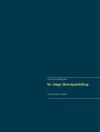This book examines the development and applications of system biology approaches for the prevention, diagnosis, and understanding of disease mechanisms. It explores the applications of system biology in infectious diseases, including host-pathogen interaction, and the identification of targets for new therapeutics and intervention strategies. It covers the use of system biology for understanding and treating metabolic disorders towards personalized and precision medicine. The book further discusses the systems biology approaches for understanding the mechanisms of tumor progression and designing more effective cancer therapies. The chapter also reviews the current strategies in autoimmune disease treatment and highlights the opportunity that systems biology represents for the development of better and safer treatments. Importantly, the book discusses the current state of the systems-level understanding of diseases and both the therapeutic and adverse mechanisms of drug actions usingsystem biology approaches. Cutting across the disciplines, this book is a valuable source for researchers in genetics, molecular biology, cell biology, microbiology, and biomedical sciences.
Mục lục
Chapter 1. Introduction to Systems Biology.- Chapter 2. Systems Biology and Human Diseases.- Chapter 3. Medical applications of Systems Biology.- Chapter 4. Systems Biology for Metabolic Disorder and Diseases.- Chapter 5. Systems Biology Consortium for Infectious Diseases.- Chapter 6. Case Study Based Approaches of Systems Biology in Addressing Infectious Diseases.- Chapter 7. Systems Biology and Hospital-Associated Infections.- Chapter 8. Systems Biology Approach in Understanding Mitochondrial Disease.- Chapter 9. Systems Approaches in Identifying Disease Related Genes and Drug Targets.- Chapter 10. Systems Approach for Identifying Drug Targets by Computational Approaches.- Chapter 11. Systems Biology Approaches for Precision Medicine.- Chapter 12. Systems Biology Approaches for Autoimmune Diseases.- Chapter 13. Systems Biology – A New Era for Vaccine Development; From Deductive Towards Inductive.- Chapter 14. The Important Role of Systems biology in Neuroscience and Neurology and Its Associated Diseases.- Chapter 15. Computational and Experimental Approaches to Decipher the Complexity of Diseases.- Chapter 16. Complex Disease Prediction using Systems Biology Approach.- Chapter 17. Systems Biology in Understanding Human Gut Microbiome and Related Diseases Highlighting Metabolic Modeling and Analysis.- Chapter 18. Understanding Colon Cancer: Causes, Prevention, and Complementary Therapies Including Therapeutic Foods, Beverages, and Meditation.- Chapter 19. The Potential of Systems Biology to Understand the Tenets of Host-Pathogen Interaction, Toxicology and Aging.- Chapter 20. Systems Biology Approaches as a Tool in Understanding Neurodevelopmental Disorders: Some Case Studies.- Chapter 21. Systems biology Approaches for Cancer Biology.- Chapter 22. Prevention, Diagnosis, and Understanding Mechanisms of Metabolic Diseases Using Systems Biology.
Giới thiệu về tác giả
Sanket Joshi is currently serving as a Professor and Deputy Director, at Amity Institute of Microbial Technology, Amity University Rajasthan, Jaipur, India. He served as Deputy Director, Oil & Gas Research Center (2018-2023), and an Application Specialist, at Central Analytical and Applied Research Unit, Sultan Qaboos University, Oman (2013-2023). Prof. Joshi has 18 years of academic teaching and research experience, and 4 years of industrial R&D experience, in India and Oman. While working in Indian pharma companies, he undertook several turnkey projects (both upstream and downstream) on antibiotics (β-lactams, macrolides, glycopeptides), antidiabetic drug (for type II diabetes), and Co-enzyme Q10. His current research interests encompass: Energy; Microbial products; and Environmental bioremediation. He serves as an Academic/Associate Editor for some of the highly reputed journals, and awarded as “NRI Senior Scientist Award”, from Microbiologists Society, India, during academic year, 2019-2020. Prof. Joshi was listed among the 2% of the ‘Stanford University – Elsevier” list of the highly cited scientists in the world for – 2022 and 2023, for excellence in scientific research in ‘Energy’ and ‘Biotechnology’ disciplines.
Dr. Rina Rani Ray joined the Department of Biotechnology as associate professor in 2017. She has done her doctoral research in the Department of Microbiology, Bose Institute, Kolkata, India and was awarded Ph.D. degree from University of Calcutta in 1996. Since then, she is working on different branches of microbiology including enzyme biotechnology, metal bioremediation and fungal biotechnology. She has published more than 75 research papers in various national and international journals. She is in the editorial board of many reputed journals. She is the member of various scientific associations and was nominated fellows of Zoological Society, India and Academy for Environment and Life Sciences, India.
Dr. Moupriya Nag is presently working as assistant professor in the department of biotechnology, University of Engineering & Management, Kolkata, India. Her Postdoctoral work was focused on exploring the aggregation kinetics and mechanism of action of peptides associated with neurodegenerative diseases in presence of various membrane surfaces with solution NMR. Her research interests include single molecule Biophysics of protein unfolding/refolding and protein aggregation kinetics and its mechanism of action especially the amyloid proteins in neurodegenerative disorders. Recently, her research focuses on functional amyloids in bacteria and their relation in forming biofilms. Her work deals with developing novel antimicrobial and anti-biofilm compounds from natural sources including plants, microbes and green synthesized nanoparticles. She has about 5 years of teaching experience in biophysics, bioinformatics, bioprocess and biotechnology, enzyme technology, computing, molecular modeling, and drug design. She has also published many research articles in the peer-reviewed international journal and authored or co-authored numerous book chapters. She is also a member of many scientific societies like Indian Biophysical Society and Indian Science Congress Association.
Dr. Dibyajit Lahiri is working as assistant professor in the department of biotechnology, University of Engineering & Management, Kolkata, India. He has experience of working with various chromatographic techniques and isolation of bioactive compounds from different plant samples. His current research interest is precisely on biofilm isolated from human prosthesis and its inhibition by various novel ‘phyto and nano’ compounds. He is keen to explore the molecular mechanism behind the removal of biofilm by natural compounds. His research arena also encompasses computational drug development by using bioinformatics. Dr. Lahiri was awarded best teacher award and best paper awardsfrom UEM, Kolkata. He is a life Member of Indian Science Congress Association and Institution of Engineers (India).












